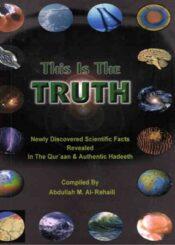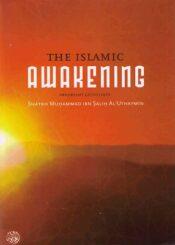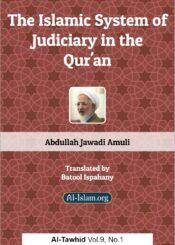The Advantages of Religion
The Advantages of Religion
0 Vote
351 View
By: Allamah Syed Muhammad Husain Tabataba'i It was revealed that religion has a profound effect in reforming the individual and the society. It is also the only means of obtaining bliss and prosperity. A society which does not abide by religion loses its realignment and intellectualism and spends its precious life in aberration, externalism, and negligence. Such a society ignores wisdom, and like animals, becomes narrow-minded and foolish. This society becomes involved in immorality and misbehavior, thus forfeiting all its humanitarian privileges. Such a society will not reach its everlasting prosperity and rather, it will experience the inauspicious outcomes and the unpleasant effects of its deviations and m is demeanors. Sooner or later, such a society will suffer from the evil consequences of its negligence and will realize that the only way towards prosperity is religion and belief in Allah. Finally, this society will regret its actions. The Almighty Allah states: "He will indeed be successful who purifies it, and he will indeed fail who corrupts it (91:9 -10)." It is necessary to understand that the application of religious instructions ensures the happiness and salvation of the individual and the society, otherwise only nomination does not help. Since it is only the reality itself that counts and not the claim for reality. Whoever claims to be a Muslim, and with his gloomy heart, inferior character, and awkward behavior expects to meet the angel of happiness, resembles a patient who expects to recover without having treatment as per the prescription. Obviously with such an idea, he will not attain his goal. The Almighty Allah states: "Surely those who believe, and those who are Jews, and the Christians and the Sabians (Sabians are those who converted from Magian to Jewish religion). , whoever believes in Allah and the Last day and does good, they shall have reward from their Lord...(2:62)." It might be assumed that, according to this verse, those who have faith in Allah and the Day of Judgment and who perform good deeds will be saved even if they do not believe in all or some prophets. But it must be realized that in Surat al-Nisa' Ayat (verses) 150 and 151, Allah considers those who disbelieve in all or some of the prophets as kafirin (unbelievers). In this respect, He states: "Surely those who disbelieve in Allah and His apostles and (those who) desire to make a distinction between Allah and His apostles and say: 'We believe in some and disbelieve in others'; and desire to take a course between (this and) that. These it is that are truly unbelievers, and We have prepared for the unbelievers a disgraceful chastisement (4:150-151)." As a result, whoever believes in all the prophets and performs good deeds will avail of his faith. Human Civilization If we study the means and factors which led to the development of human societies in the past, this truth becomes evident to us that in his life, man only demands and pursues his own prosperity and happiness. Of course, this happiness would not be possible without the total provision of all means of existence. On the other hand, with his understanding, gifted by Allah, man realizes that he can never attain and prepare all his needs on his own, so as to provide the means of his ideal welfare and prosperity, because he realizes that he cannot solve the problems of life and reach perfection by himself. As a result, he necessarily submits himself to a social life to supply his needs and considers cooperation with others as the easiest means towards achieving his goal. He engages in acquiring the means of his livelihood collectively. That is to say, each person undertakes to provide some of the means and makes them available. Then, all individuals gather the outcome of their activities. Proportionate with his activity and social status, each individual takes a share and uses it to manage his life. In this way, he will work hand in hand with his fellowmen to ensure his welfare. This is to say that they all endeavor for one another and pile up the outcomes of their activities. Then each member of the society gathers the product of his activity in accordance with his position and the extent of his endeavor. The Need for Regulations in The Society As the results of the activities of individuals are linked with one another and since everyone wants to benefit from them, forcibly, inconvenience and conflict of interests are indispensable elements of this contact and constant relation. It is needless to say that material benefits are normally the source of all kinds of differences, animosities, and loss of sincerity. In order to maintain sincerity among people, society requires a series of regulations, the observance of which prevents disturbance and chaos. It is self-evident that if no laws and regulations for the management of the society exist, there will be a chaos in which human society cannot survive even for a single day. Certainly, these rules vary from one society to another based on the extent of civilization or savagery of tribes and nations, and the level of understanding of societies and their governments. In neither case is a society free from the need of a series of traditions and regulations which are at least respected by most of its members. In the history of mankind, never has a society evolved without possessing common rites, traditions, and regulations. Man is Not Free Against Regulations As man performs all his actions with his own free will and choice, he feels a sort of freedom of action for himself. By considering this freedom of action as "absolute", that is, "unconditional", he wants total freedom and escape from any restriction. For this reason, man suffers from any prohibition and deprivation inflicted on himself. Finally, he feels compelled and senses failure whenever a restriction is imposed on him. Therefore, no matter how small the number of social regulations, they are against man's freedom-seeking nature because they limit him to some extent. On the other hand, he finds that if he disagrees to forfeit a part of his freedom by abiding by the laws for the sake of the protection of society and its order, a chaos will result that will suddenly annihilate all his freedom and peace. This is just as if he seizes a morsel from others when others will undoubtedly seize morsels from him. In like manner, if he oppresses others, they will oppress him as well. Therefore, in order to maintain some freedom for himself, he dispenses with a part of his freedom and inevitably respects social regulations. Weak Point in the Implementation of Regulations As mentioned before, there is a kind of conflict and incompatibility between man's freedom-seeking nature and social regulations. That is, laws are like chains that are linked to man's feet and he constantly tries to break them and set himself free from captivity. This is the greatest danger which always threatens social regulations and shakes its foundations. In this regard, alongside practical regulations and duties, there are always other regulations intended to punish offenders which frighten and prevent them from opposition, and to encourage people to abide by the laws by making them confident of receiving rewards and prizes. It cannot be denied that the subject matter (i.e., fear of punishment and eagerness for receiving rewards) aids the enforcement of laws to some extent, but it cannot fully prevent violations and safeguard the influence and domination of laws. This is because penal codes, like other laws, are vulnerable to violation and are constantly threatened by the freedom-seeking nature of man, because those who have full power and capability can overtly oppose them without fear and fright, or they can force judicial and executive organizations to act according to their desire, by using their influence. And those who do not have adequate influence and power can take advantage of the negligence or weakness of the authorities to fulfill their oppositions covertly. They can attain their ends through bribery, mediation, or by way of friendship and relationship with the influential sector to disrupt the working order of the society and to paralyze it. The best evidence for this subject is that every day we observe thousands of these types of oppositions and violations against laws in various human societies. The Original Source of the Weakness of Laws We must now find out where the original source of danger lies and how to subdue the unyielding and freedom seeking nature of man in order to prevent his opposition to the law. The source of this danger, which is the main cause for penetration of corruption in a society and which cannot even be prevented by regulations, is that the ordinary social methods which have brought the laws into existence consider the material aspects of individuals and ignore their spiritualities and instincts. They only aim at providing harmony, maintaining order, and balancing the actions of people in such a way that will not result in discord and conflict. Social laws demand adherence of their articles and tend to control the actions of people. Such laws ignore men's innate attributes and innermost feelings which instigate their actions and which are the internal enemies of regulations. Whenever the freedom-seeking nature of man and hundreds of other instincts (such as selfishness, voluptuousness, which are the main causes of corruption) are ignored, there will be chaos and disturbance and the scope of differences will become wider day by day. Since all laws are always threatened by the attack and invasion of powerful rebels and the night-time attacks of ingenious robbers springing from these instincts; therefore, they fall short of preventing corruption and differences. The Advantage of Religion Over Other Laws The latest social method for the protection of laws is to establish penal codes and appoint officials to enforce them. But as mentioned earlier, penal laws and officials cannot restrain the mutinous nature and other rebellious instincts of man and fail to enforce social regulations. In addition to appointing officials to maintain control and formulating regulations to castigate violators and rebels as established by human laws, religion has other powerful means at its disposal whereby it can defeat and annihilate any antagonistic force. (1) As a result of uniting social life and the worship of the Almighty Allah, religion has initiated a divine responsibility for man in all his individual and social acts and holds man responsible in all his endeavours and hesitations. Since Sublime Allah has full control over man by His infinite might and knowledge he is thoroughly aware of any thought that man nurtures in his mind and any secret in man's heart; and nothing is hidden to Him. In addition to appointing an external police, religion puts man under the care of his conscience which never neglects its duty. Man cannot escape from the rewards and retribution of conscience. The Almighty Allah states: " ... And Allah comprehends what they do (8:47)." "... And He is with you wherever you are ,.. (57:4)." "... And your Lord will most surely pay back to all their deeds in full ...(11:111)." "... Surely Allah ever watches over you (4:1)." If we compare the conditions of a man who is governed by laws with one who lives under the jurisdiction of religion, the advantage and superiority of religion will become quite evident. A society, whose members are all religious and perform their religious du ties and know that Allah observes their action in every respect, is protected from the malevolence of its members towards one another. Thus, the general public who live in such an environment are safeguarded against the actions and statements of others. They even have security in their thinking, whereas this purport does not exist in the laws of the universe. Religion has also prohibited man from mistrust. "O you who believe! avoid most of suspicion, for surely suspicion in some cases is a sin, and do not spy... (49:12)." Man feels quite comfortable in a religious environment. He will spend a lifetime in utmost joy and comfort and will attain everlasting welfare. But in a society governed only by human laws, man refrains from unlawful acts when he sees the police watching his actions; otherwise, he may commit any offence. (2) Under the guidance of religion, every religious person discovers the fact that his life is not limited to a life of short duration in this ephemeral world, rather there is an infinite and endless life ahead of him which does not terminate by death. He realizes that the only way to attain everlasting prosperity and eternal comfort is to follow religious laws descended by the Almighty Allah through His prophets. He knows that religious laws are descended by the Wise, Powerful, and Knowledgeable Allah who controls man's inward and outward behaviour and. who examines man's overt and covert activities. It is, therefore, impossible for man to conceal an act so as to undermine Allah's commands. (3) According to his religious beliefs, every pious man knows that performing religious orders is, in fact, the obedience to Allah. Even if by so doing he does not get any rewards from the standpoint of servitude, he will receive a good remuneration by the favour and grace of Allah. Thus by observing religious commandments, he voluntarily makes a dealing and transaction, because he forfeits a part of his freedom willingly and, in return, gains the satisfaction of Compassionate Allah and receives an excellent reward. By following religious rules and provisions, a, religious man quite happily engages in dealings. The more he loses his freedom, the more he receives benefits. He sells a merchandise and replaces it with a better one. But one who is not committed to religion considers the observation of laws and provisions a loss for himself. His freedom-seeking nature suffers from the loss of a part of his freedom and seeks an opportunity to set himself free from captivity in order to regain his freedom. Be it known that religion differs from laws in other respects as well. Religious people willingly avoid committing sins, but the followers of laws only avoid committing crimes because of fear. Religion controls the entire body of pious men, whereas laws only dominate the hands and feet. Religion commands openly and secretly, but laws can only command publicly. Not only is religion a guardian preventing blameworthy acts, but also it is a teacher and educator teaching virtue and perfection. Laws, however, have no other function but to serve as police. If we assume the benefit of other laws to be one u nit, then the advantage of religion is more than a thousand units. Thus, those who try to uproot religion by adhering to other laws resemble people who cut their legs by their hands and then replace them with wooden legs. Thus, from the aforementioned statements, it becomes evident that religion is the best and most exalted way that can organize human society and persuade people to observe social laws more than any other method. Seeking a Remedy By Others The underdeveloped countries of the world that have thought of their progress and improvement in the last century, despite the fact that they have accepted a social government, but as they have disregarded the weaknesses of laws and have not benefited from the power of religion, they have led a gloomy life and their environment has become a model of savagery. On the other hand, the progressive and intelligent people of the world who have discovered the weaknesses of laws have sought a remedy to save them from absolute failure and have thus taken another course of action. These people organize the method of their education in such a way that individuals, willingly or not, will be brought up by a series of proper ethics, so that upon entrance into the field of activity, they will consider the laws sacred and inviolable. This kind of education results in the regular progress of laws and, as a result, guarantees the prosperity of the society to a considerable extent and saves the laws from failure. It should be realized that there are two modes of thinking by which a society educates itself. (1) Thoughts and beliefs such as philanthropy, benevolence, and compassion towards subordinates which are based upon realism and are undoubtedly adopted from divine religions. Since antiquity, before progressive societies evolved, religion invited people towards this mode of thinking. Consequently, the prosperity and welfare experienced in progressive societies due to these thoughts are considered as the blessings of religion. (2) Useless and unreal thoughts and beliefs that have no value except in the realm of superstition such as inculcating people with the belief that if they suffer or get killed to save their country, their names will be imprinted in history with golden words. Although these superstitious thoughts render practical results and may influence an individual to make sacrifice in the battlefield and to destroy a large number of the enemies, their disadvantages overshadow their advantages. This way of thinking makes man superstitious and disrupts his instincts of realism, because for those who disbelieve in Allah and the Day of Judgment who consider death as inexistence and annihilation, the everlasting life and prosperity after death has no meaning whatsoever. Due to his nature and temperament granted by Allah, man seeks a religion. This is because, in the course of life, he constantly struggles to provide prosperity for himself and uses all possible means to meet his requirements. He always seeks effective causes which are undefeatable. On the other hand, there are no causes in the world with permanent and undefeatable effects. The fact that man, on the basis of his nature, demands an undefeatable cause and seeks an indestructible refuge to which he can connect his life and find peace of mind for his prosperity is demanded by religion. It is only the Almighty Allah whose will can never be overcome and subdued. Allah is free from pretext and shortcomings. The way of life that is connected to Allah is only the religion of Islam and nothing else. Therefore, it can be said that man's instinctive yearning is one of the best reasons that substantiate the threefold fundamentals of religion: Tawhid (monotheism), à Nubuwwah (prophethood) à and Ma'ad (resurrection), because man's instinctive perception which is an inherent part of his particular framework never makes a mistake. For example, man never mistakes the meaning of friendship for that of animosity. Nor does he mistake the feeling of thirst in his own natural perception for being quenched. It is true that man sometimes desires to have feathers in order to fly as a bird or to be in the sky like a star, but he, wholeheartedly and earnestly, seeks a real support for his happiness, an absolute comfort, or a completely humanitarian life. As long as a man lives, he will never give up this idea. If an undefeatable cause (Allah) did not exist in the world of existence, man would not have thought of it with his immaculate nature. If an absolute and unparalleled peace and tranquility (which is the peace and tranquility of the world Hereafter) did not exist and if the religious policy (sent to us through prophetic mission) was not legitimate, then this desire would not have been engraved on man's mind. A Summary of the History of Religions In conducting a brief investigation on the origination of religions, the most confident approach that can be depended upon from a religious point of view is the Holy Qur'an, because it is free from errors, mistakes, prejudice, and spitefulness. The Holy Qur'an states this briefly by saying: "Surely the (true) religion with Allah is Islam...(3:19)." The divine religion, which is the very religion of Islam, has accompanied man from the first day that he came into existence. As stipulated by the Holy Qur'an, the present generation of man originates from one man and one woman. In the Holy Qur'an, the man has been called Adam. He was a prophet to whom divine wahy (divine revelations) had been descended. Adam's religion was. very simple and included a few general regulations such as the people should remember Allah and should be kind to each other and specifically to their parents and should keep aloof from corruption, murder, and evil acts. After Adam and his wife, their children spent their lives with extreme simplicity and without differences of opinion. As the number of people increased, they gradually gathered together and formed a community life. In this manner, they learned how to live and came closer to civilization. As the number of people proliferated little by little, they divided themselves into different tribes, in each of which there were noblemen whom the people respected. Even after the demise of these nobles, the people made their statues and paid tribute to them. It was exactly at this time that idolatry became prevalent, and as it is cited by religious leaders, idolatry originated in this way. The history of idolatry confirms this matter as well. Little by little, as a result of the unjust behavior of the mighty towards the weak, differences of opinion sprang up. These disagreements and accidental differences of opinion resulted in various forms of conflicts in life. The generation of these conflicts that led to man's deviation from the path of prosperity towards misery and destruction was the reason that Compassionate Allah assigned prophets and sent a Divine Book that settled man's differences. As the Almighty Allah states: "(All) people are a single nation; so Allah raised prophets as bearers of good news and as warners, and He revealed with them the Book with truth, that it might judge between people in that which they differed... (2:213)." Source: alhassanain.com






